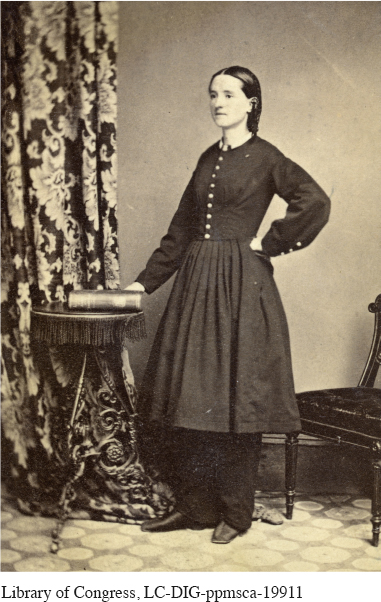Women Aid the War Effort
Women of all classes contributed to the war effort, North and South. Thousands filled jobs in agriculture, industry, and the government that were traditionally held by men while others assisted the military effort more directly. Most Union and Confederate officials initially opposed women’s direct engagement in the war. Yet it was women’s voluntary organization of relief efforts that inspired the federal government to establish the U.S. Sanitary Commission. By 1862 tens of thousands of women volunteered funds and assistance through hundreds of local chapters across the North. They hosted fund-raising fairs, coordinated sewing and knitting circles, rolled bandages, and sent supplies to the front lines. With critical shortages of medical staff, some female nurses and doctors eventually gained acceptance in northern hospitals and field camps. Led by such memorable figures as Clara Barton, Mary Ann “Mother” Bickerdyke, and Dr. Mary Walker, northern women almost entirely replaced men as military nurses by the end of the war.

In the South, too, much of the medical care was performed by women. But without government support, nursing was never recognized as a legitimate profession for women, and most nurses worked out of their own homes. As a result, a Confederate soldier’s chances of dying from wounds or disease were greater than those of his Union counterpart. Southern women also worked tirelessly to supply soldiers with clothes, blankets, munitions, and food. But this work, too, was often performed locally and by individuals rather than as part of a coordinated Confederate effort.
Some Union and Confederate women played more unusual roles in the war. A few dozen women joined Rose Greenhow in gathering information for military and political leaders. One of the most effective spies on the Union side was the former fugitive Harriet Tubman, who gathered intelligence in South Carolina, including from many slaves, between 1862 and 1864. Even more women served as couriers, carrying messages across battle lines to alert officers of critical changes in military orders or in the opponent’s position. In addition, at least four hundred women disguised themselves as men and fought as soldiers.
Union women also sought to influence wartime policies. Following the Emancipation Proclamation, Elizabeth Cady Stanton, Susan B. Anthony, and Lucy Stone founded the Women’s National Loyal League and launched a massive petition drive to broaden Lincoln’s policy. Collecting 260,000 signatures, two-thirds of them from women, the League demanded a congressional act “emancipating all persons of African descent” everywhere in the nation.
Exploring American HistoriesPrinted Page 429
Exploring American Histories Value EditionPrinted Page 317
Chapter Timeline